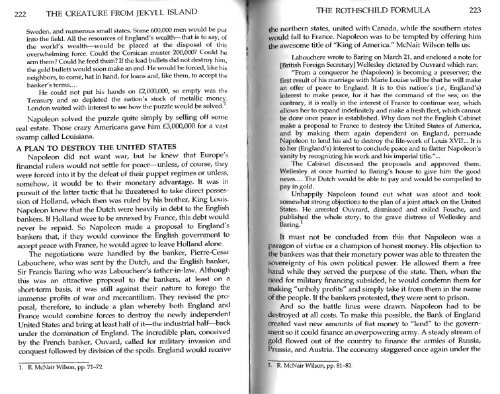You also want an ePaper? Increase the reach of your titles
YUMPU automatically turns print PDFs into web optimized ePapers that Google loves.
222 THE CREATURE FROM JEKYLL ISLAND THE ROTHSCHILD FORMULA 223<br />
Sweden, and numerous small states. Some 600,000 men would be put<br />
the northern states, united with Canada, while the southern states<br />
into the field. All the resources of England's wealth—that is to say, of<br />
would fall to France. Napoleon was to be tempted by offering him<br />
the world's wealth—would be placed at the disposal of this<br />
the awesome title of "King of America." McNair Wilson tells us:<br />
overwhelming force. Could the Corsican muster 200,000? Could he<br />
arm them? Could he feed them? If the lead bullets did not destroy<br />
Labouchere wrote to Baring on March 21, and enclosed a note for<br />
him,<br />
[British Foreign Secretary] Wellesley dictated by Ouvrard which ran:<br />
the gold bullets would soon make an end. He would be forced, like his<br />
"From a conqueror he (Napoleon) is becoming a preserver; the<br />
neighbors, to come, hat in hand, for loans and, like them, to accept the<br />
first result of his marriage with Marie Louise will be that he will make<br />
banker's terms....<br />
He could not put his hands on £2,000,000, so empty was<br />
an offer of peace to England. It is to this nation's (i.e., England's)<br />
the<br />
interest to make peace, for it has the command of the sea; on the<br />
Treasury and so depleted the nation's stock of metallic money.<br />
contrary, it is really in the interest of France to continue war, which<br />
London waited with interest to see how the puzzle would be solved.<br />
allows her to expand indefinitely and make a fresh fleet, which cannot<br />
Napoleon solved the puzzle quite simply by selling off some<br />
be done once peace is established. Why does not the English Cabinet<br />
real estate. Those crazy Americans gave him £3,000,000 for a vast<br />
make a proposal to France to destroy the United States of America,<br />
and by making them again dependent on England, persuade<br />
swamp called Louisiana.<br />
Napoleon to lend his aid to destroy the life-work of Louis XVI?... It is<br />
A PLAN TO DESTROY THE UNITED STATES<br />
to her (England's) interest to conclude peace and to flatter Napoleon's<br />
Napoleon did not want war, but he knew that Europe's<br />
vanity by recognizing his work and his imperial title."...<br />
1. R. McNair Wilson, pp. 71-72. 1. R. McNair Wilson, pp. 81-82.<br />
financial rulers would not settle for peace—unless, of course, they<br />
The Cabinet discussed the proposals and approved them.<br />
were forced into it by the defeat of their puppet regimes or unless,<br />
Wellesley at once hurried to Baring's house to give him the good<br />
news....<br />
somehow, it would be to their monetary advantage. It was<br />
The Dutch would be able to pay and would be compelled to<br />
in<br />
pay in gold.<br />
pursuit of the latter tactic that he threatened to take direct possession<br />
of Holland, which then was ruled by his brother, King Louis.<br />
somewhat strong objections to the plan of a joint attack on the United<br />
Unhappily Napoleon found out what was afoot and took<br />
Napoleon knew that the Dutch were heavily in debt to the English<br />
States. He arrested Ouvrard, dismissed and exiled Fouche, and<br />
bankers. If Holland were to be annexed by France, this debt would<br />
published the whole story, to the grave distress of Wellesley and<br />
never be repaid. So Napoleon made a proposal to England's<br />
Baring.<br />
bankers that, if they would convince the English government to<br />
It must not be concluded from this that Napoleon was a<br />
accept peace with France, he would agree to leave Holland alone.<br />
paragon of virtue or a champion of honest money. His objection to<br />
The negotiations were handled by the banker, Pierre-Cesar<br />
the bankers was that their monetary power was able to threaten the<br />
Labouchere, who was sent by the Dutch, and the English banker,<br />
Sir Francis Baring who was Labouchere's father-in-law. Although<br />
sovereignty of his own political power. He allowed them a free<br />
hand while they served the purpose of the state. Then, when the<br />
this was an attractive proposal to the bankers, at least on a<br />
need for military financing subsided, he would condemn them for<br />
short-term basis, it was still against their nature to forego the<br />
making "unholy profits" and simply take it from them in the name<br />
immense profits of war and mercantilism. They revised the proposal,<br />
i'of the people. If the bankers protested, they were sent to prison.<br />
therefore, to include a plan whereby both England and<br />
And so the battle lines were drawn. Napoleon had to be<br />
France would combine forces to destroy the newly independent<br />
destroyed at all costs. To make this possible, the Bank of England<br />
United States and bring at least half of it—the industrial half—back<br />
created vast new amounts of fiat money to "lend" to the government<br />
so it could finance an overpowering army. A steady stream of<br />
under the domination of England. The incredible plan, conceived<br />
by the French banker, Ouvard, called for military invasion and<br />
gold flowed out of the country to finance the armies of Russia,<br />
conquest followed by division of the spoils. England would receive<br />
[Prussia, and Austria. The economy staggered once again under the


